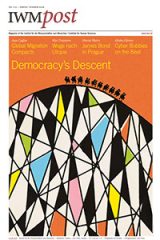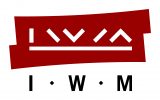

In collaboration with
The Institute for Human Sciences
The Institute for Human Sciences / Institut für die Wissenschaften vom Menschen (IWM) is an independent institute for advanced study in the humanities and social sciences. Since its foundation in 1982, it has hosted more than 1500 scholars, journalists and translators from all over the world. Many of the Institute’s Permanent and Visiting Fellows are regular contributors to Eurozine or its focal points Eurasia in Global Dialogue and Ukraine in European Dialogue (see below).
Website: www.iwm.at
Twitter: @IWM_Vienna
Youtube: IWMVienna

Articles

Control groups
An interview with William Davies on politics in an age of sensation
The classic liberal distinction between war and peace has expired. Markets have learnt the lesson that gut reactions matter, but political institutions of liberal democracy are still lagging behind. What we need is a politics of empathy, William Davies argues.

Made in the EU
Why workers are fleeing Romania’s garment industry
‘Sweatshops’ are usually associated with labour outsourced to east- and south-east Asia, but they exist inside the EU too. Gruelling working conditions in Romania’s low-pay garment industry, which supplies clothes for mid-market and luxury retailers alike, force many people to go abroad in search of a real living wage.
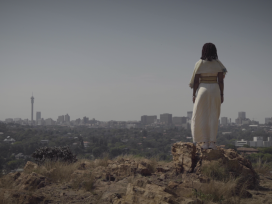
Changing places
Notes for an essay film
After moving from Johannesburg (Jo’burg) to Gothenburg (Go’burg), filmmaker Jyoti Mistry struck up a friendship with someone who went the other way: Katarina Hedrén, who was adopted by a white Swedish family, and moved to South Africa as an adult. This deeply personal take on race shows how ‘colour-blindness’ denies that racial prejudice exists but robs people of colour of words to talk about the discrimination they face.
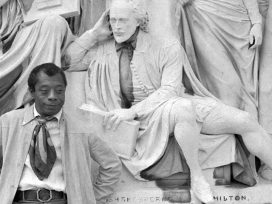
In a politicized age, the scepticism and elegance that have traditionally characterized the art of the essay can seem extravagant. In the US in particular, there have been calls for essayists to trim their sails and position themselves explicitly. Does the new mood of engagement mean that the essay’s habitual rejection of dogmatism is passé?
Focal points
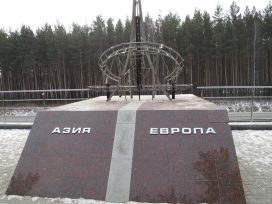
The focal point presents the findings of the project ‘Eurasia in Global Dialogue’ being carried out at the Institute for Human Sciences, Vienna (IWM). The focal point is an extension of the earlier focal point, ‘Russia in Global Dialogue’ that ran in Eurozine and at the IWM from 2012–2018.

Post-revolutionary Ukrainian society displays a unique mix of hope, enthusiasm, social creativity, collective trauma of war, radicalism and disillusionment. With the Maidan becoming history, the focal point ‘Ukraine in European Dialogue’ explores the new challenges facing the young democracy, its place in Europe, and the lessons it might offer for the future of the European project.
Projects and publications
